By MELINDA J. OVERSTREET
for Glasgow News 1
More frequently than perhaps some realize, it becomes necessary for children to be in a home other than parents’, and those circumstances may happen suddenly, with no time for the person(s) taking responsibility for the children to have prepared or purchased supplies.
Even once a child is somewhat settled in at a new location, needs continue that the new caregiver/guardian may not be in a position to afford.
Situations like these are why Nona’s Nest started.
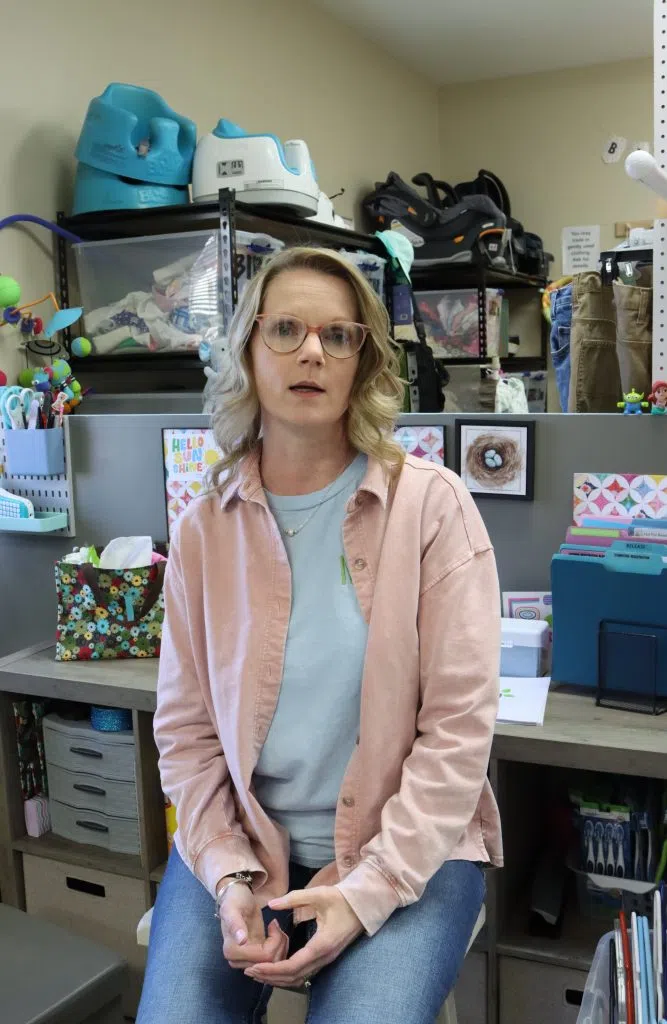
Jini Payne, founder and president of Nona’s Nest, discusses some of the procedures there. Melinda J. Overstreet / for Glasgow News 1
This local nonprofit organization has been in existence for a relatively short time but can be a huge help to the folks who are taking on the care of a child ages birth to 18 years who is not their biological offspring.
“We offer clothing and other necessities to children in out-of-home care, and out-of-home care is essentially children who do not live with their biological parents, so foster care; kinship care, which is children who are being raised by grandparents, aunts, uncles …; and there what’s known as fictive kin, which is someone you had a relationship to before you were removed from your parents, but you’re not actually related – a babysitter, a neighbor, mom’s best friend,” said Jini Payne, founder and president of Nona’s Nest.
She said that, in particular, they help a lot of grandparents who have their grandkids or even great-grandkids in their care.
“They break my heart. They’re on fixed income most of the time, and they did not plan on having extra children, and sometimes there is no money coming from anywhere for those kids,” Payne said.
Payne said that a lot of people think that all the cost involved with taking in a child is covered by state programs, and it’s not, and not everyone gets that aid, even.
Sometimes, eligibility for help through state programs requires caregivers to make changes they simply can’t afford, she said, and there are other hoops to jump through that can, at the very least, lead to delays in getting any funding assistance.
“It can be a very big ordeal for grandparents,” she said.
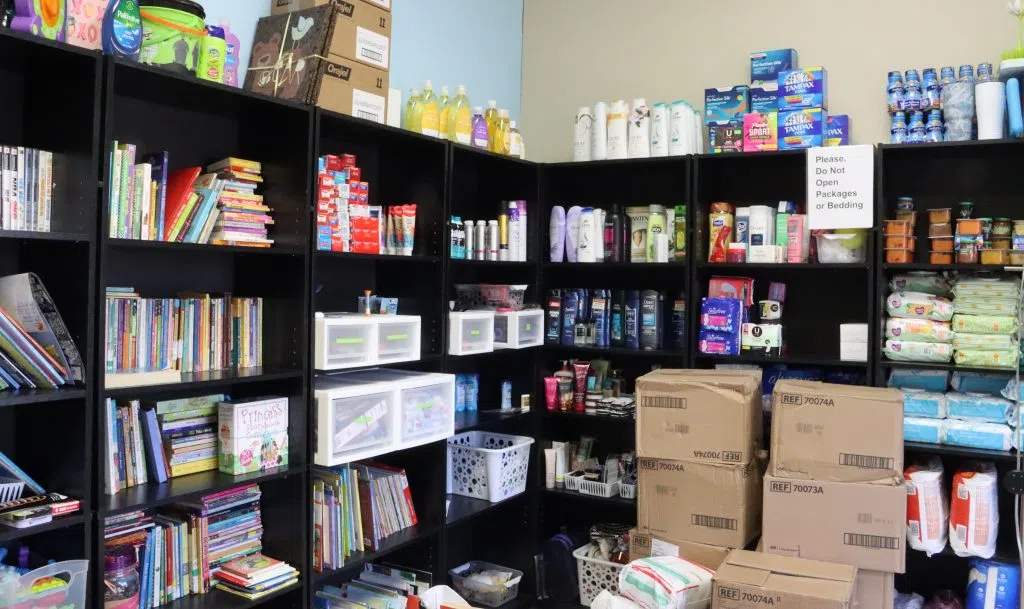
Items offered by Nona’s Nest at no cost to children ages birth to 18 years in out-of-home care, including foster care, include personal hygiene products and books. Melinda J. Overstreet / for Glasgow News 1
The items on the shelves at Nona’s Nest include diapers, pull-ups, wipes, toiletries and other personal care items, feminine hygiene products, bottles, sippy cups, shoes, socks, underwear, hairbows, bedding like crib sheets and blankets, walkers, car seats, backpacks/totebags and occasionally high chairs and strollers.
“If it’s not donated, we’ve purchased it with money that was donated,” she said.
Sometimes the funds have come from local churches or, occasionally, a civic organization. One individual person sends $100 monthly via Venmo, etc.
Sometimes she’ll ask for a specific need, like a crib or twin beds, by posting it on Facebook, and someone will offer to pay for or actually purchase those things.
“We had someone donate money specifically for car seats. I’m going to go, hopefully, soon, to the Fruit of the Loom store and get some socks and underwear. … Socks and underwear go fast, and nobody wants them secondhand; we try to keep them new,” Payne said. “We don’t have any [regular] revenue. … We have a lady that coupons that brings a lot of the toiletries. We have some people that just, like once a month, drop of diapers and wipes. Most of the clothes are secondhand, and they’re just donated by people from the community that bring them. … We do not put out clothes that are stained, torn, excessively worn. We want kids to have clothes that look nice. Nobody wants to wear yucky clothes.”
She said they also won’t put out items with missing buttons or zippers that don’t work.
She has to check car seats that are donated to see whether they are out-of-date, and those cannot be used, so then she has to cut off the straps and take other steps to ensure they are disposed of properly. They should have a least a year of use left and they must not have been involved in a wreck.
“Twin beds, cribs and mattresses for them are always a hot commodity,” Payne said. “They don’t last very long.”
Also, diapers or pull-ups always go fast, and wipes go even faster, she said.
Adult-sized clothing should be teenager-appropriate, e.g. still in style.
“What we don’t get a lot of is men’s pants,” she said.
Kids are usually looking for comfortable pants, including leggings and sweats, and they can usually use more sport bras, Payne said. Often, the girls don’t have any idea what size regular bra they need, and the sizing is simpler on sport bras.
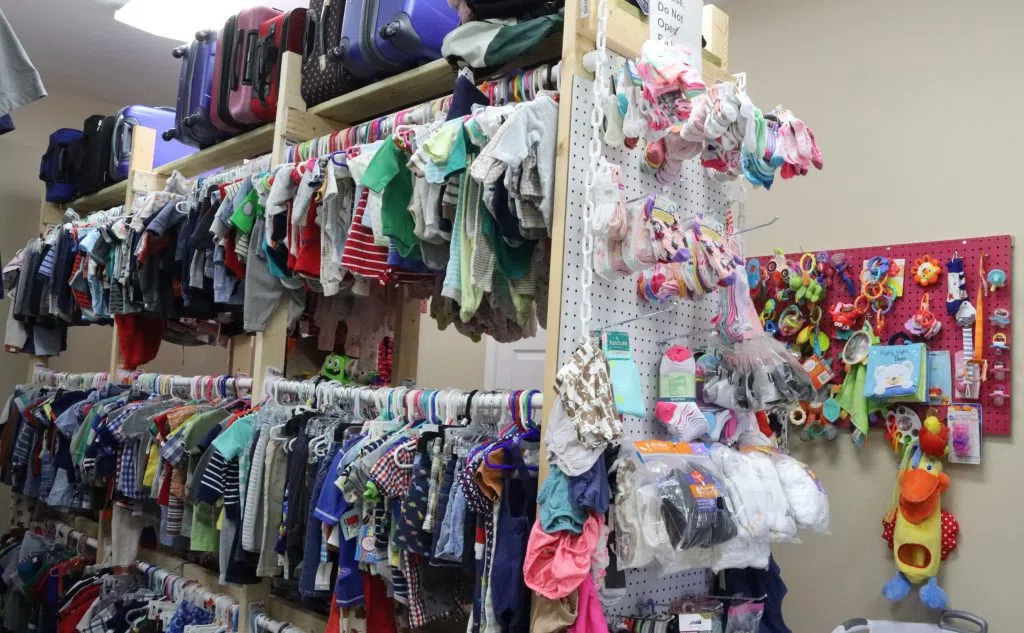
Clothing, including underwear and socks, are among the items offered at Nona’s Nest. Melinda J. Overstreet / for Glasgow News 1
“We usually have more girls’ clothes than boys’. Boys are harder on their clothes, and boys tend to wear the same thing until it is not worth [donating],” Payne said. “We offer every child a Bible; those are donated as well. We refer to other places if it’s something we don’t have here.”
She said they have an excess of toys currently, and they don’t move as fast.
Nona’s Nest has a wish list on Amazon to give potential donors an idea of what the needs are, but, as Payne said, it doesn’t matter to her where the actual purchasing takes place or what brand they are.
These items at Nona’s Nest are provided at no cost to those the organization serves, but documentation such as custody, guardianship or foster-care placement paperwork is required to demonstrate that the adult seeking help is legally responsible for the child’s care.
“There’s a list over there, and that’s what they can have,” she said. For example, “if it’s a new placement, if they’ve had the child less than 30 days, they can have 30 items on hangers. Out of that, they can have one swimsuit, one lightweight jacket and one heavy jacket, so that way, someone’s not coming in and taking all of [a type of item]. … We don’t always have everything that’s on there, and sometimes we have stuff that’s not on there. Sometimes we get crazy things in here, like we have lamps right now.”
Typically, one large item, e.g. strollers, car seats, walkers, etc., per child per year is allowed, and they can shop for other things every two months.
So the list is meant as a guideline, with no guarantees the things will be available, and some things may be flexible on a case-by-case basis.
“We very seldom have people in here who are not extremely grateful,” Payne said.
Sometimes, people have commented on social media posts that they don’t understand why the organization helps only the children who are in out-of-home care. She’ll delete them but respond to the person privately.
She said they do this to help the kids, and she and her family have lived the circumstances, so they know what it’s like and what many of the challenges are.
“We know what it’s like to get kids in that you didn’t expect. Typically, you don’t get warning,” Payne said. “They call you and go, ‘We’ve got these kids; can you take them?’”
You don’t always have time to prepare, and you don’t know that they’ll bring with them.
“You don’t know until you’ve got the kids what you’ll need,” she said, “and even then sometimes you don’t know.”
And trying to obtain the needed items is happening in the midst of what seems like a hundred other things that have to be done, like required medical appointments, school enrollments and social worker visits.
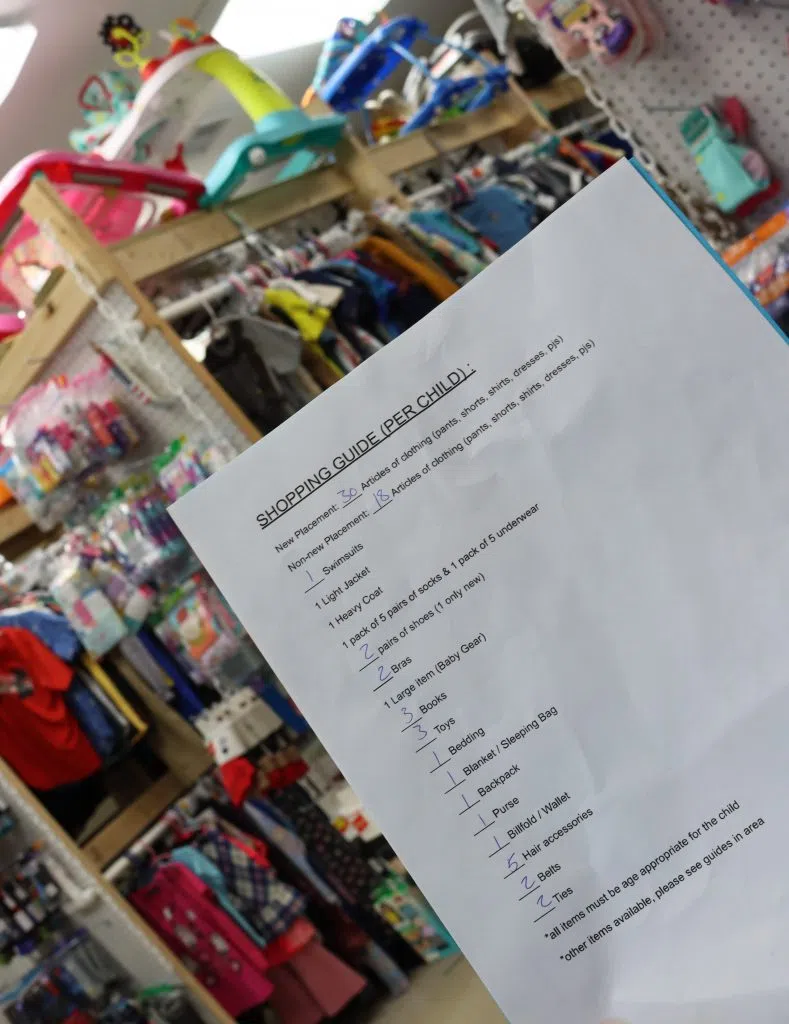
Shoppers at Nona’s Nest are provided with a list of items and the quantities they can get of each type of product, provided they are in stock. Melinda J. Overstreet / for Glasgow News 1
“We do a lot of supporting each other in here,” Payne said.
Those who have been through the process offer the occasional advice to the newly involved and share information about where to find other resources, the best places to get this or that, for example, or they know someone who may be able to answer a question someone has. They can safely vent to each other as well. Payne said the foster care system can be extremely stressful to navigate.
“Nobody knows everything, but we all know a little bit,” she said.
Staffing and hours
Payne’s other titles notwithstanding, “I am also the cleaning lady and, you know, the post-office-box checker and the bathroom cleaner and the, you know, whatever needs to be done [person],” she said.
At this time, Nona’s Nest has no paid employees, even Payne, so the hours are totally dependent upon when volunteers are available to be there.
“We post on Facebook as we have volunteers,” she said. “We try to be open at least two Saturdays a month. Our goal is to eventually be open every Saturday. And then we try to be open one afternoon and one evening a month, but we are always available for an emergency. … That’s the best we can do right now.”
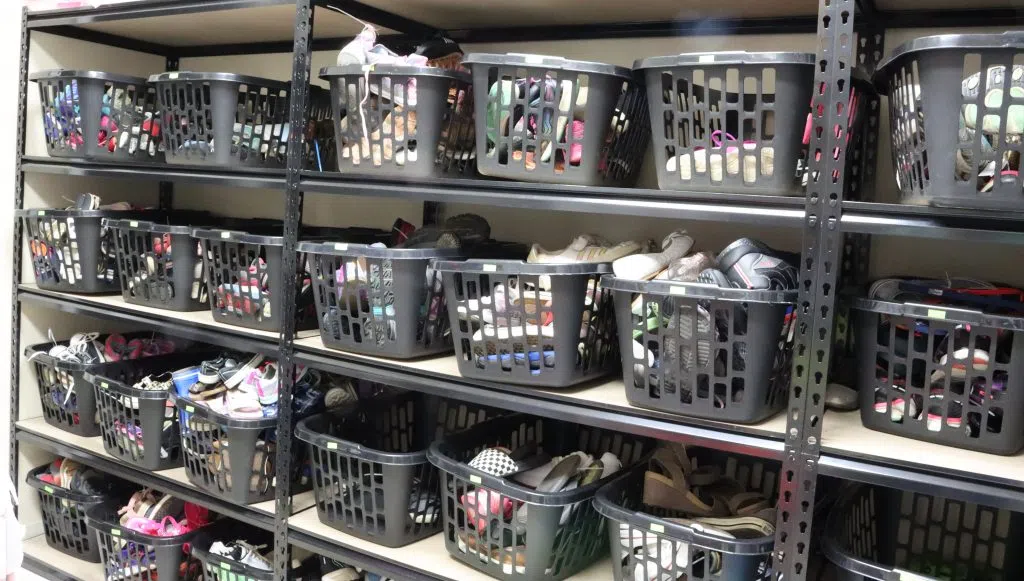
Shoes are among the items offered by Nona’s Nest at no cost to children ages birth to 18 years in out-of-home care, including foster care. Melinda J. Overstreet / for Glasgow News 1
She has around 10 core volunteers who regularly help, and others come less often. She said they are always looking for volunteers to sort or hang clothing.
“I am in desperate need of volunteers to help on the days the shop is open. We could be open more if I had more volunteers. It’s not a difficult job. It’s just basically being here, saying, ‘Let me see your paperwork; here’s what you can have,’” Payne said, and then they would need to look over the items the person wants to ensure they’re following the list guidelines.
She has made copies of examples of the types of paperwork that would need to be provided to help volunteers know what they’re looking for.
“We don’t even keep their paperwork; we just mark that we’ve seen it,” Payne said.
The seven-member board of directors meets roughly quarterly and more often if needed.
She said a lot of the discussions at those meetings center on how to make things happen.
“Originally, I said, ‘Please be on my board; I’ve got to have at least four of us,’” Payne said.
Since then, as a couple of members have decided they can no longer commit the time or effort for whatever reason, the process is that existing members vote to decide on the acceptance of board members, but exclusivity definitely isn’t the goal.
“If they have a beating heart ….,” Payne said, semijokingly, adding that they don’t have to know a lot as long as they care and they’re willing to learn and follow directions.
On that note, she added that kids are often great volunteers, because they will follow directions and do what needs to be done. For example, a group of Eastern Elementary School students in Junior Beta Club came and helped out once a month for a while with things like sorting hangars, punching holes in index cards, etc.
“They would come in and knock it out and get it done,” she said.
History
Payne and her husband Rex first became foster parents in 2010 with three biological sisters whom Jini had come to know through being the court-appointed special advocate for their case, and they were around the same ages as the Paynes’ two biological children. Those five children are all in their mid- to late 20s now, and two girls who are 10 and 17 have arrived in the home over the past couple of years.
In 2019, though, three foster babies who are biological siblings were placed in the Paynes’ care. Although they weren’t their first fosters, they were definitely the youngest. At the time, they were 10 months, 18 months and 3 years old, and the Paynes hadn’t had babies in the home in a long time, she said.
“We did not have baby equipment, so we put the word out that we needed things. People brought us all kinds of stuff; they brought us clothes. We also spent quite a bit of money, because there’s just things you’ve got to go buy, and there were three of them,” she said. “They all three were in diapers. We needed three car seats – just a lot of things. So from that, people brought us things, and then they would say, ‘I know these don’t fit the kids that you have, but I know you know people [who can use them],’ and it got to where my garage and my attic were full and we had to come up with a more efficient plan.”
Those three little foster children started calling her Nona – pronounced like non-uh – she said, and when her biological grandchildren were born, her daughter and daughter-in-law decided that’s what those kids should call her as well, so that’s the origin of that part of the organization’s name. Those children are no longer with the Paynes, though.
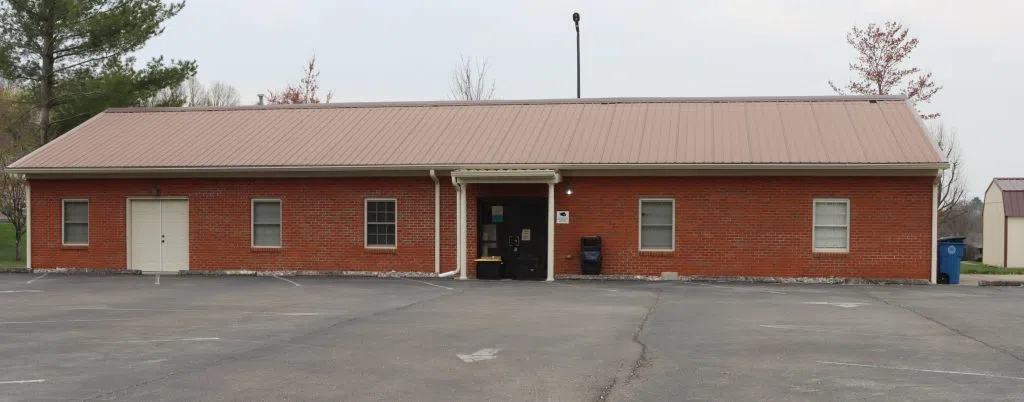
Although Nona’s Nest is nestled in a corner of the parking lot at Immanuel Baptist Church, 104 Western Hills Road, Glasgow, it is a separate, standalone organization. Melinda J. Overstreet / for Glasgow News 1
The wife of the former pastor of Immanuel Baptist Church got permission from the church leaders for the use of what had at one time been a picnic pavilion – a brick building at one corner of the church’s parking lot, and the church provides the space and cost of utilities. They moved in two years ago in February.
“My husband and I try to fix things if something needs to be repaired over here,” Payne said.
If it’s something they can’t manage, they ask the church leadership how they want it handled, and they typically will come take care of it, she said.
They had registered as a nonprofit organization the fall before that and then had a fundraiser to purchase the materials they would need to get the place organized for their purpose – shelving, clothes racks, etc., and her husband built the clothes racks.
Nona’s Nest has since served more than 1,000 children, Payne said.
— This report is part of the Nonprofit Knowledge series.
—————————–
NONPROFIT IN A NUTSHELL
NAME: Nona’s Nest Inc.
PHYSICAL ADDRESS: 104 Western Hills Road, Glasgow
(Immanuel Baptist Church property, but separate entity)
MAILING ADDRESS: P.O. Box 1476, Glasgow KY 42142
PHONE: 270-576-4463
EMAIL: NonasNestGlasgow@gmail.com
SOCIAL MEDIA: https://www.facebook.com/KYNonasNest on Facebook
PUBLIC HOURS*: Usually at least two Saturdays, one afternoon and one evening per month, with eventual goal of every Saturday; other times occur as volunteers are available. Updates are posted on social media.
SERVICES OFFERED: Necessary and some other supplies, clothing, etc. for children in out-of-home care, e.g. foster, kinship and/or fictive. Items are supplied at no charge, but with some limits.
RECIPIENT ELIGIBILITY: Official documentation of custody/care situation; Kentucky residency.
DONATION REQUIREMENTS: Underwear and socks must be new. All items must be clean. Car seats must have at least one year before expiration and be in working condition. Cash contributions are also accepted for the purchase of some items when not in stock.
FUNDING/MATERIALS SOURCES: Contributions from a couple of churches, including housing and utilities from Immanuel Baptist; occasional contributions from businesses; and mostly individual donors.
OVERSIGHT: Volunteer seven-member board of directors.
STAFFING: No paid employees. Roughly 10 to 12 core volunteers and others at various times.
*nonholidays
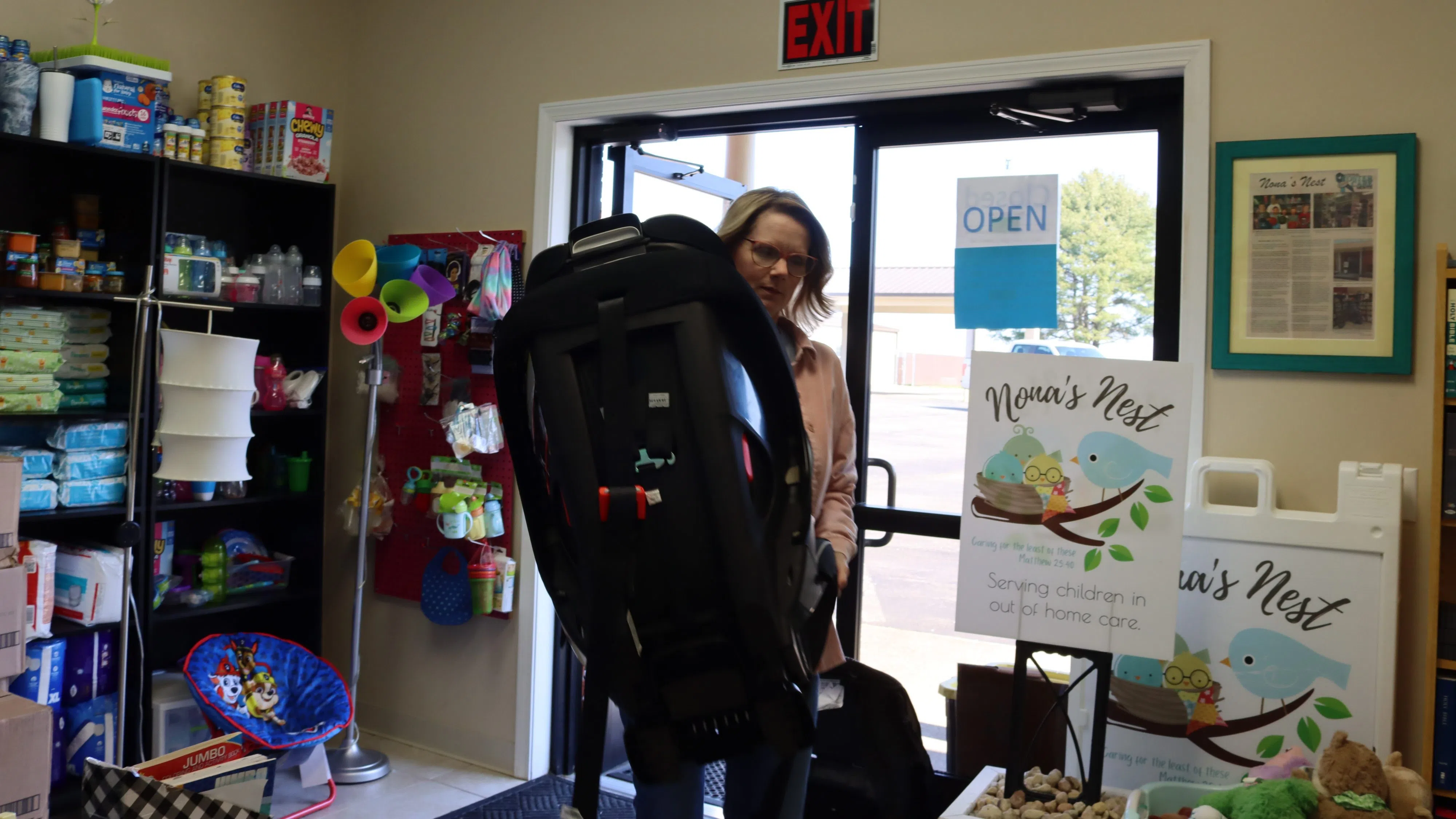
Comments